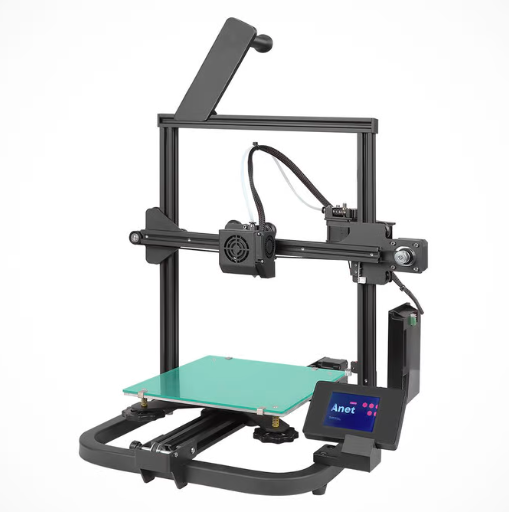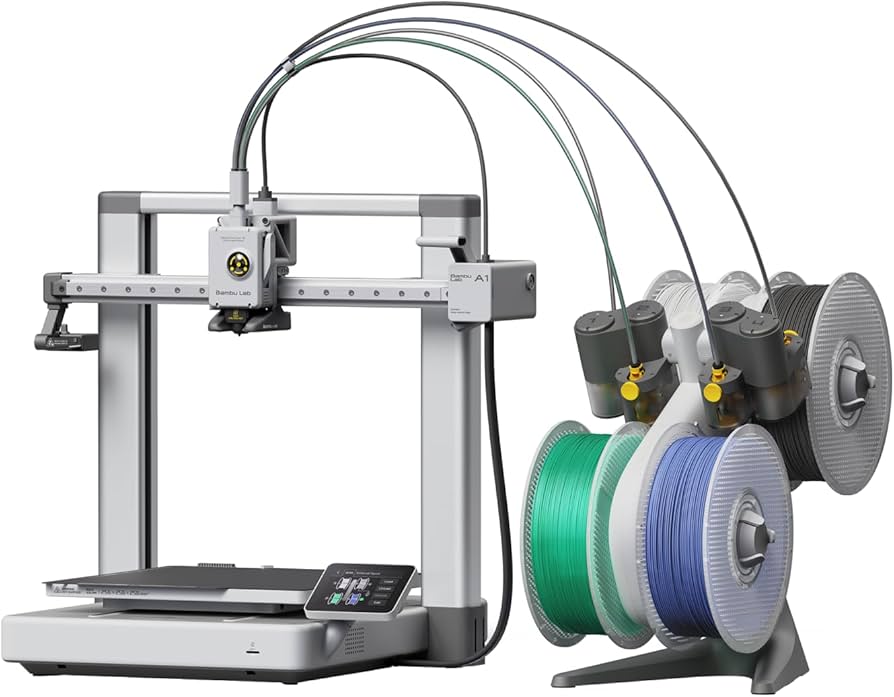Compare A8 V2 vs A1
Comparison between the best 3D printers
Choose the best 3D printer at the best price. The cheapest 3D printers are here.
Buy a 3D printer here with 3D Fila.
 |
 |
|
| Model | A8 V2 |
A1[BUY A1] |
| Printing Material | Filament | Filament |
| Buy Filament for Anet A8 V2 | Buy Filament forBambu Lab A1 | |
| Estimated price | $129,00 | $700,00 |
| Manufacturer | Anet | Bambu Lab |
| Release Year | 2021 | 2023 |
| Print Volume [mm] | 220x220x250 | 256x256x256 |
| Printer Size [mm] | 428x441x486 | 385x410x430 |
| Weight [kg] | 6,2 | 8,3 |
| Power Loss Recovery | NO | YES |
| Enclosed printer | NO | NO |
| Bed Leveling | Manual | Automatic |
| Filament End Sensor | NO | YES |
| Bed type | Heated | |
| Power supply system | Bowden | Direct Drive |
| Standard nozzle | 0,4 | 0,4 |
| Maximum Nozzle Temperature [°C] | 230 | 300 |
| Maximum Bed Temperature [°C] | 100 | |
| Maximum printing speed [mm/s] | 150 | 500 |
| Filament holder | YES | YES |
| Camera for supervision | NO | NO |
| Recommended filaments | PLA | PLA, PETG, TPU, PVA |
| Recommended slicers | Cura, Simplify, Slic3r, IdeaMaker | SuperSlicer, PrusaSlicer, Cura, OrcaSlicer |
| Maximum Resolution [mm] | 0,1 | 0,1 |
| Processor | ||
| Display | Display touchscreen 2,8'' | Touchscreen 3,5 |
| Power Supply | 110/220V / 250W | 350 W |
| Connectivity | SD / USB | Wi-Fi, Bambu-Bus, Cartão Micro SD |
| Operating systems | Windows, Mac, Linux | Windows, Linux, Macbook |
| Date of registration in the system | 2022-11-10 | 2024-07-17 |
| Release date | 2021 | 2023 |
| Extra features | The Anet A8 V2 is a Cartesian-XZ type 3D printer with a build volume of 220 x 220 x 250 mm, Ender 3 design and V-slot assembly. It has a 32-bit motherboard and touchscreen interface, promising ease of use. It uses open source firmware and has thermal failure protection. It stands out for its cable organization and the absence of a heated bed, focusing on energy savings and PLA printing. It comes with an external power adapter, aiming at greater safety, especially for beginners and educational use. | The BambuLab A1 printer features fully automatic calibration, multi-color printing with the AMS system, active flow rate compensation, quick nozzle change with a clip, active motor noise cancellation, a build volume of 256x256x256 mm³, a maximum extruder temperature of 300°C, and a heated bed of up to 100°C. In addition, it has high precision, a machine health management system and an intuitive 3.5-inch touchscreen interface. |
| Support for multiple colors and materials (AMS and CFS) | NO | YES |
Notes * |
||
| Cost-benefit | 6 / 10 | 7 / 10 |
| Hardware | 0.6 / 10 | 4.8 / 10 |
| Tela | . | . |
| Print volume | 3 / 10 | 4 / 10 |
| Performance | 1 / 10 | 4 / 10 |
| [BUY A1] |
Conclusion |
| In comparing the Anet A8 V2 and the Bambu Lab A1, the choice ultimately depends on the user's specific needs and experience level. The Anet A8 V2 is an entry-level 3D printer, offering a lower price point and basic features. It is ideal for beginners who want to explore the world of 3D printing without a significant financial investment. Its manual bed leveling and lower maximum print speed make it less suitable for advanced users or projects requiring high reliability and efficiency. However, it provides an essential understanding of 3D printing mechanics and is a practical option for simple PLA projects. Conversely, the Bambu Lab A1 is a more advanced machine justifying its higher cost with superior features. It includes automatic bed leveling, enhanced print speeds, and compatibility with a wider range of filaments, making it suitable for professional or more ambitious amateur users. The Bambu Lab A1 supports multi-material printing and offers advanced features like active flow rate compensation and a machine health management system. Additionally, its touchscreen interface and connectivity options cater to modern user demands for convenience and efficiency. In summary, if budget constraints are a priority and the user is just starting, the Anet A8 V2 makes a solid choice. However, for those seeking advanced performance, versatility, and features that support a broader range of projects, the Bambu Lab A1 represents a worthwhile investment in quality and technology. Ultimately, understanding one's printing needs and budget will determine the best fit between these two models. |

